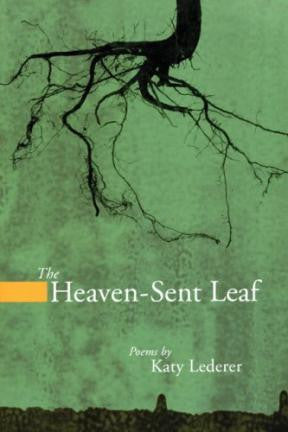
About This Title
In The Heaven-Sent Leaf, Katy Lederer draws on her experience as both acclaimed younger poet and “brainworker” at a hedge fund in midtown Manhattan to produce an uncannily prescient work of high lyric. Though on its surface The Heaven-Sent Leaf addresses that most taboo of subjects—money—what it ultimately confronts is what it means to be, as Wallace Stevens put it, “finally human.” Working in the tradition of the flaneur, Lederer charts her speakers’ interior landscapes according to the city’s highly monetized geography, viewing life in the big city through the lens of expenditure—not just of money, but of all that money signifies. In poems that are both heartfelt and ruthlessly critical of our current financial milieu, in which the fates of individuals are packaged, priced out, and then bundled for sale on the open market, Lederer proves Robert Graves’s famous observation wrong: though there may be no money in poetry, there is indeed poetry in money. "Sparkling and strange, acrobatic but never evasive, clear-eyed about its own emotional life even as it takes semantics for a tumble, Katy Lederer's book-length sequence of not-quite-sonnets measures up to its contemporaries as a chronicle of love in and out of a life, in dramatis personae and in the poet's own soul; it excels all thise contemporaries, and swerves away from almost all its precedents, in following at once the love and the money."--Stephen Burt "The world and words of finance and love overlap, and it is in this realm that Katy Lederer's second book of poems...takes place...The Heaven-Sent Leaf is a timely publication, reflecting the folly of our financial pursuits and suggesting there must be another way."--Bookslut "[A] collection of poetry animated by the idea of the economic bubble...If this is not a formula for literary success, it's good market timing, at least; she might be the John Paulson of verse."--The New Yorker
Me, a Brainworker
Me, a brainworker toiling in pristine white hallways.
Abnormal, aboriginal, endemic to this site.
Some people sell their wares outside.
In the pulsating light of Times Square they are singing.
In their noses and nipples, the glinting of rings.
Let us call them unoriginal.
Let us call them all these awful things.
The busy unoriginals are throwing out their trash,
But on this lovely parchment they are writing priceless poems.
They suppose that by such rendering they'll be remembered after death.
They suppose that by such influence their souls will sing eternally.
In the hallways, we are killing time,
Its blood now thick and lurid on the freshly painted walls.
© BOA Editions, Ltd 2008
Available editions:
--------------------------------------------------------------------------------
Paperback ISBN: 978-1-934414-15-6
Price: $16.00
Publishing Date: October 2008

